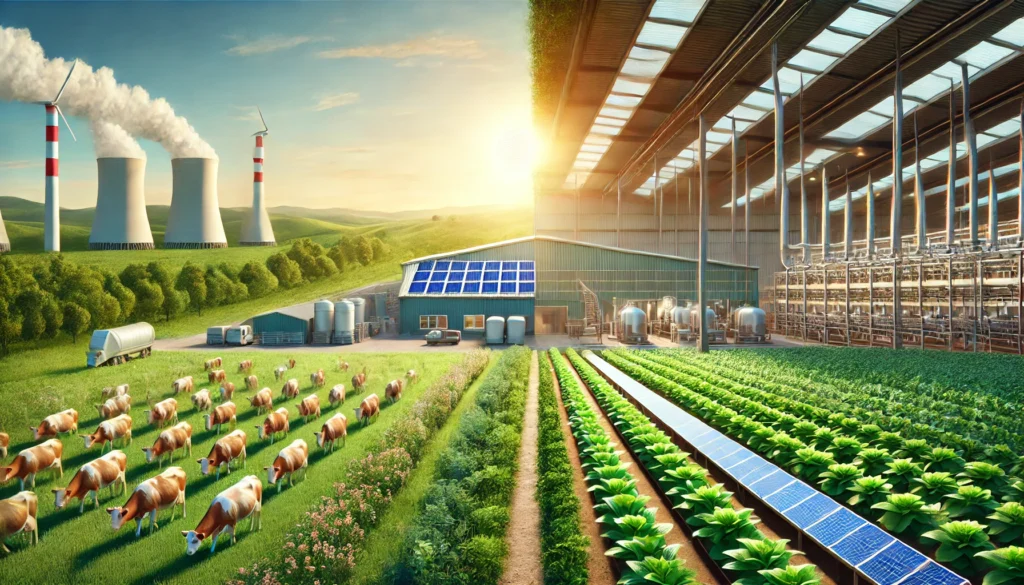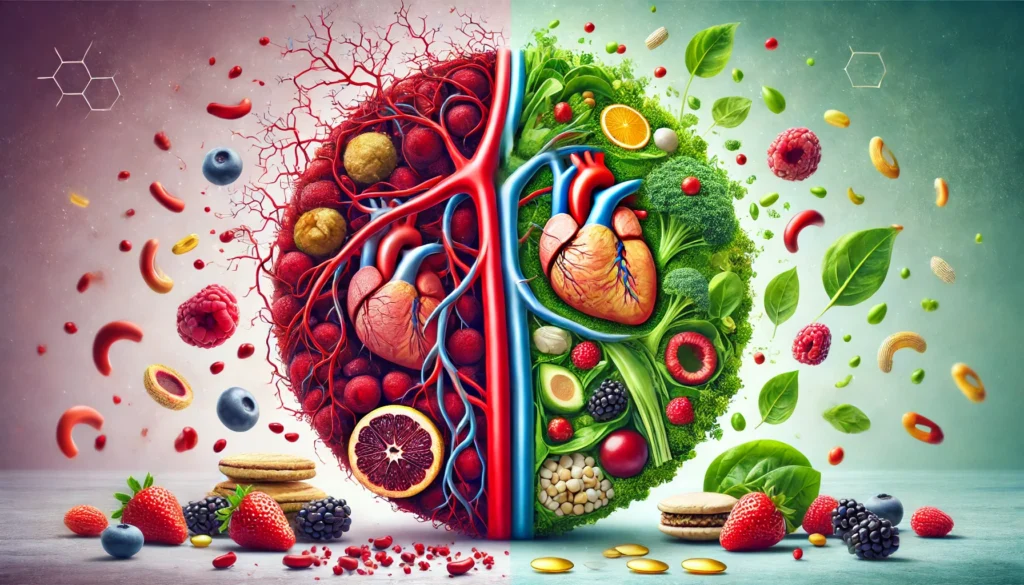Adopting a vegan lifestyle is no longer seen as a fringe movement or a passing dietary trend. As more individuals around the world seek sustainable, ethical, and health-conscious ways to live, the question arises: Why do people go vegan? For some, the decision stems from a desire to reduce their environmental footprint. For others, it’s about compassion for animals or addressing chronic health issues. Whatever the motivation, the movement toward veganism is grounded in a growing body of scientific evidence that supports plant-based living as a viable, health-promoting, and ethically aligned choice. The reasons to go vegan are as varied as the people who choose this path, yet common threads of health, sustainability, and morality continue to unite them.
You may also like: Is a Plant-Based Diet Healthy? What the Science Says About the Benefits of Eating More Whole Plant Foods
For readers new to this topic, it’s important to distinguish between adopting a vegan diet and embracing a vegan lifestyle. A vegan diet excludes all animal products—meat, dairy, eggs, and even honey—while a vegan lifestyle typically extends to avoiding leather, wool, and any products tested on animals. This article focuses primarily on the diet aspect, with due consideration to the ethical and environmental motivations that often accompany it. In examining the question of why are people vegan, we uncover not only individual stories of transformation but also societal shifts that are redefining how we eat, shop, and live.
In the sections that follow, we’ll explore the primary science-backed reasons for going vegan, integrating health, environmental, ethical, and cultural perspectives. Whether you’re curious about the plant-based movement, considering the switch yourself, or simply seeking to understand why someone might make this change, this comprehensive guide provides the insights you need. By grounding each reason in credible research and real-world application, this article seeks to answer the question, why do people become vegan, with clarity, nuance, and depth.

Health Benefits of a Plant-Based Diet
One of the most compelling reasons to be vegan is the profound impact it can have on overall health. A growing body of research suggests that whole-food, plant-based diets can help prevent, manage, and even reverse chronic diseases. This is particularly relevant in the context of the modern epidemic of lifestyle-related illnesses, including heart disease, type 2 diabetes, hypertension, and obesity. For many people, the realization that they can reclaim their health through dietary change becomes a catalyst for adopting veganism.
Scientific studies consistently show that vegans tend to have lower body mass indexes (BMIs), reduced cholesterol levels, and better blood pressure readings compared to their omnivorous counterparts. A 2019 review published in the Journal of the American Heart Association found that individuals following plant-based diets had a significantly lower risk of cardiovascular mortality. These findings are not just statistically significant—they’re also clinically relevant. They demonstrate how dietary choices influence long-term health outcomes in meaningful ways.
Another critical reason why people go vegan is the role of diet in diabetes prevention and management. Research from the American Diabetes Association has demonstrated that low-fat vegan diets improve glycemic control and insulin sensitivity. This makes plant-based eating an evidence-based option for people seeking to manage or even reverse type 2 diabetes without relying solely on medications. The fiber-rich nature of plant foods also promotes satiety and weight loss, two factors crucial in diabetes management.
Moreover, there is increasing interest in the potential of vegan diets to support mental health. Preliminary research indicates that plant-based diets rich in fruits, vegetables, legumes, and whole grains may be associated with lower rates of depression and anxiety. While more studies are needed in this area, the anti-inflammatory properties of many plant foods could play a key role. Inflammation is increasingly recognized as a contributor to mental health disorders, and dietary strategies to reduce it are gaining attention.
In sum, for those wondering why go vegan, the health benefits offer a strong and scientifically validated incentive. Choosing a plant-based diet is not simply about avoiding animal products—it’s about embracing a way of eating that nourishes the body, reduces disease risk, and may even extend longevity. These are not abstract promises; they are measurable outcomes backed by decades of nutritional research.
Environmental Sustainability and Climate Impact
While personal health often motivates the initial transition, concern for the planet is another major reason why people become vegan. The environmental cost of animal agriculture is staggering, contributing significantly to greenhouse gas emissions, deforestation, water pollution, and biodiversity loss. With climate change becoming an increasingly urgent global issue, many individuals are reevaluating the environmental impact of their dietary choices.
According to a landmark report by the United Nations Food and Agriculture Organization, livestock farming is responsible for approximately 14.5% of all human-induced greenhouse gas emissions—more than the entire global transportation sector. This includes methane from cows, nitrous oxide from manure, and carbon dioxide from deforestation. Reducing or eliminating animal product consumption is one of the most effective actions individuals can take to lower their carbon footprint. For those wondering why would someone go vegan, environmental responsibility is a clear and pressing rationale.
Water usage is another significant concern. Producing just one pound of beef requires over 1,800 gallons of water, while plant-based proteins such as lentils or tofu require a fraction of that amount. This discrepancy becomes particularly critical in regions experiencing drought or facing water scarcity. Choosing plant-based foods not only conserves water but also helps reduce water pollution caused by runoff from factory farms and slaughterhouses.
Deforestation, especially in the Amazon rainforest, is driven in large part by demand for animal agriculture. Vast tracts of forest are cleared for grazing land or to grow soy—most of which is fed to livestock, not humans. This destruction of biodiversity hotspots contributes to the extinction of countless plant and animal species and undermines global climate stability. When people ask why are people vegan, the answer often involves a commitment to preserving the Earth’s natural resources for future generations.
Importantly, the conversation around sustainability is not limited to global statistics. It also involves local environmental justice issues, such as the siting of factory farms in low-income or marginalized communities. These operations often pollute air and water, disproportionately affecting the health and quality of life of nearby residents. Veganism, for some, is an act of solidarity against these injustices—a stand for both ecological and human rights.
When it comes to sustainability, the science is unequivocal: plant-based diets are far less resource-intensive than those centered on animal products. This understanding continues to drive interest in veganism as a viable climate solution. As climate anxiety rises, the decision to switch to a plant-based lifestyle is increasingly framed as a personal act of environmental responsibility.

Frequently Asked Questions: Why Do People Go Vegan?
1. Is veganism more than just a diet—can it reshape identity and values?
Absolutely. For many individuals, transitioning to a vegan lifestyle becomes a transformative experience that reshapes their core identity, values, and worldview. The decision is often rooted in a reevaluation of ethical beliefs, environmental responsibility, and personal integrity. This deeper connection between food choices and moral principles explains why people go vegan not just to improve their health, but to live in alignment with their values. As the lifestyle becomes a reflection of one’s ethics, it also helps clarify why would someone go vegan—because it becomes a way to live more honestly, compassionately, and intentionally.
2. Can going vegan influence your social relationships or community connections?
Yes, adopting a vegan lifestyle often reshapes social dynamics. While some people experience friction when they first explain why they are vegan to friends or family, many also find new communities that are deeply supportive. Shared values around sustainability and animal welfare can foster strong bonds, whether through local vegan meetups or digital platforms. These connections can help solidify the decision for those wondering why go vegan in the first place—it’s not only about individual health or ethics, but about belonging to a broader movement that shares your priorities. This aspect of social integration can provide long-term motivation and emotional support.
3. How does cultural background affect the reasons to go vegan?
Cultural background plays a nuanced role in shaping why people become vegan. In some regions, religious or philosophical traditions—such as Jainism or certain forms of Buddhism—encourage nonviolence and plant-based eating. In others, traditional diets may already be largely plant-based due to geographic or economic factors. However, in societies where meat consumption is tied to cultural identity or masculinity, the decision to go vegan can be more complex and even controversial. Understanding the cultural dimensions helps explain why would someone go vegan in one context but face challenges in another. Navigating this dynamic requires both self-awareness and resilience.
4. Is it expensive to be vegan in the long term?
Contrary to popular belief, being vegan doesn’t have to break the bank. Staples like beans, lentils, rice, oats, and seasonal vegetables are often among the most affordable items in any grocery store. What can drive up costs are specialty vegan products—meat analogs, artisanal cheeses, or pre-packaged meals—which are optional, not essential. For someone wondering why do people go vegan despite budget concerns, it helps to know that with proper planning, a whole-food plant-based diet can be economically sustainable and even cost-saving over time. Financial accessibility can be a powerful answer when people ask why be vegan in today’s economy.
5. How does veganism intersect with food justice and social equity?
The reasons to be vegan increasingly intersect with food justice movements, especially in addressing systemic inequalities in food access and health outcomes. Many communities face diet-related diseases not from personal choice but from lack of access to nutritious food. Advocates argue that why do people become vegan should also include a recognition of privilege and a commitment to making plant-based eating more accessible to all. This perspective reframes why are people vegan as not just a personal decision but a public health and social equity issue. Activists are working to bring affordable, culturally relevant vegan food into underserved areas, expanding the scope of what it means to eat compassionately.
6. Can veganism support athletic performance and strength training?
Yes, plant-based athletes are proving that you don’t need animal products to build strength, endurance, or muscle mass. From elite marathoners to Olympic weightlifters, a growing number of high-performing athletes are thriving on vegan diets. Strategic nutrient planning—especially around protein, iron, and B12—can ensure optimal results. For some, why go vegan stems from a desire to optimize physical performance while avoiding the inflammation often associated with animal-based foods. This adds a compelling layer to the conversation around reasons to go vegan, especially for those with active lifestyles.
7. What are some emerging trends in the future of plant-based living?
The plant-based sector is rapidly evolving, with innovations like cell-cultured meat, precision-fermented dairy, and regenerative plant farming. These advancements are reshaping the conversation around why be vegan by offering increasingly sustainable and ethical alternatives to traditional animal agriculture. As supply chains improve and consumer demand grows, vegan options are becoming more diverse, affordable, and accessible. These innovations show that why would someone go vegan today may differ from five years ago, as science and industry continue to make plant-based living more viable. The future of veganism looks increasingly inclusive and solution-oriented.
8. How can people deal with nutritional deficiencies on a vegan diet?
Proper planning is key to avoiding nutrient gaps. Common concerns—like vitamin B12, omega-3s, and iron—can be addressed through fortified foods or supplements, as well as strategic food combinations. For example, pairing iron-rich beans with vitamin C–rich bell peppers enhances absorption. When people ask why do people go vegan despite these challenges, the answer often includes a willingness to learn and adapt. Many find that these small adjustments are a worthwhile trade-off for the ethical and environmental benefits that explain why are people vegan in the first place.
9. Can going vegan influence emotional or psychological well-being?
Many report that becoming vegan brings emotional clarity and a sense of inner peace. This feeling often comes from aligning personal values with daily behavior, reducing cognitive dissonance. For those who ask why be vegan, this alignment can result in reduced guilt and a greater sense of purpose. Some also experience a heightened sense of empathy and interconnectedness, reinforcing their choice. These internal changes highlight deeper reasons to go vegan—it’s not just about what’s on the plate, but about who you become in the process.
10. How do vegans maintain motivation in the face of social pressure or setbacks?
Maintaining motivation often involves a mix of community support, continuous learning, and personal reflection. Vegans may return to the documentaries or books that first inspired them or stay connected to advocacy groups that keep the cause alive. For someone wondering why do people become vegan and stick with it, internal conviction and a supportive network are essential. The most lasting reasons to be vegan usually go beyond surface-level trends and tie into deeper values around justice, health, and sustainability. Understanding why go vegan—and regularly revisiting that “why”—is what helps people stay the course even in challenging environments.

Ethical Concerns About Animal Welfare
Perhaps the most emotionally resonant reason why people go vegan is their concern for animal welfare. The ethics of consuming sentient beings—particularly when alternatives are readily available—is a question that compels many to reconsider long-held dietary habits. For those who ask, why do people go vegan, the answer often lies in a moment of awakening: a documentary watched, a book read, or a farm visit that brought them face-to-face with the reality of animal suffering.
Modern animal agriculture is far removed from the idyllic family farm image that many people associate with food production. The majority of meat, dairy, and eggs consumed today come from industrialized factory farms where animals are often confined in cramped, unsanitary conditions, subjected to painful procedures, and denied natural behaviors. Investigative journalism and undercover footage have revealed disturbing practices, from the mass culling of male chicks in the egg industry to the brutal conditions in pig farrowing crates. Once people become aware of these realities, many feel ethically compelled to change their diets.
The philosophy behind ethical veganism rests on the belief that animals have intrinsic value and the right to live free from exploitation and harm. This perspective aligns with principles of nonviolence, compassion, and justice. For many vegans, avoiding animal products is not just a dietary choice but a moral imperative—an expression of empathy toward all sentient beings. When asked why be vegan, ethical consistency is often a core reason cited.
Moreover, the rise of animal rights activism has played a significant role in public awareness. Organizations like PETA, Mercy For Animals, and The Humane League have launched campaigns that not only expose cruelty but also promote cruelty-free alternatives. Social media has amplified these messages, making it easier than ever for individuals to access information and connect with communities that share their values.
It’s also worth noting that ethical concerns are not limited to overt abuse. Many vegans argue that even “humane” or “free-range” labels often mask systemic exploitation. Questions about whether it is ever justifiable to commodify living beings persist, leading some to reject all animal agriculture regardless of how it is practiced. The ethical case for veganism, then, is not merely about avoiding cruelty—it is about affirming a worldview in which the interests of all sentient beings are respected and protected.
Further Reading:
What is a plant-based diet and why should you try it?
6 Science-Based Health Benefits of Eating Vegan
plant-based lifestyle, vegan health benefits, sustainable eating, ethical food choices, animal welfare issues, climate-friendly diet, plant-based nutrition, vegan environmental impact, whole food diet, cruelty-free living, veganism and fitness, mental health and diet, eco-conscious nutrition, dairy-free alternatives, meatless meals, compassionate eating, vegan athlete diet, plant-based protein sources, reducing carbon footprint, conscious consumerism
The information contained in this article is provided for general informational purposes only and is not intended to serve as medical, legal, or professional advice. While NewsHealthWatch strives to present accurate, up-to-date, and reliable content, no warranty or guarantee, expressed or implied, is made regarding the completeness, accuracy, or adequacy of the information provided. Readers are strongly advised to seek the guidance of a qualified healthcare provider or other relevant professionals before acting on any information contained in this article. NewsHealthWatch, its authors, editors, and contributors expressly disclaim any liability for any damages, losses, or consequences arising directly or indirectly from the use, interpretation, or reliance on any information presented herein. The views and opinions expressed in this article are those of the author(s) and do not necessarily reflect the official policies or positions of NewsHealthWatch.

